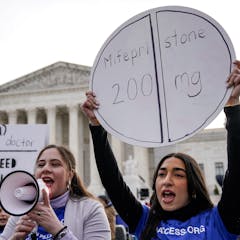
Articles on US abortion law
Displaying 1 - 20 of 37 articles

While anti-abortion rights activists have lobbied politicians to enforce trigger laws in some states, these advocates have not faced opposition in other places.

EMTALA requires hospitals to provide stabilizing treatment to all patients – but Idaho is arguing that its abortion ban means it doesn’t have to allow the procedure, even if it is medically needed.

There are many outdated laws that states keep on the books, even if they aren’t used. If the Supreme Court overturns legal precedents on rights like same-sex and interracial marriage, that can change.

Two legal scholars who study abortion-related laws explain what happened at the Supreme Court in a case that could make it harder to get an abortion.

Women in Texas and in other states with abortion bans are suing, asking for clarification on when medical exceptions could actually be granted.

Scientists can create viable eggs from two male mice. In the wake of CRISPR controversies and restrictive abortion laws, two experts start a dialogue on ethical research in reproductive biology.

As the government’s oldest consumer protection agency, the FDA has long butted up against drugmakers, activists and politicians. But undermining its work could be harmful to patient health and safety.

Mifepristone’s safety in medication abortions has been well established over more than two decades, but legal wrangling leaves the future of the drug hanging in the balance.

Many people wonder how courts can rule in contradictory ways. But it happens relatively frequently.

The increase in abortion restrictions may also lead to a decline in access to emergency contraceptives.

The FDA’s allowance for pharmacies to dispense mifepristone will broaden access to the two-pill mifepristone-misoprostol regimen of medication abortion, which is 95% to 98% effective.

Abortion referendums in such states as California and Kentucky provide a way to protect abortion rights at the state level – but voting limitations could undermine the power of the ballot box.

Abortion rights were on the ballot in five states during the midterm elections – all broke in favor of abortion-rights advocates.

States taking the strictest stands against abortion tend to have among the worst statistics in the nation on child and family well-being.

Human embryos are far more likely to die than come to term, an evolutionary trait seen across species. Laws granting personhood at conception ignore built-in embryo loss, with potentially grave consequences.

When ideological enemies talk across their great divides, something good can happen – it reduces stereotypes and inflammatory language directed at people who don’t agree on the abortion rights issue.

As many as 80% of young people want abortion to be legal, and most disagree with the Supreme Court’s recent Dobbs v. Jackson ruling. This could lead to high youth voting rates in the 2022 midterms.

Only 24 countries today totally ban abortion. The Dobbs v. Jackson Women’s Health Organization decision in the US is unlikely to lead other countries to join that list.

Several rap songs speak on the subject of abortion from the perspective of the unborn child.

Tennessee and Wisconsin are among the states that can jail pregnant women because of illegal substance use, despite major medical groups saying that this practice isn’t effective.
